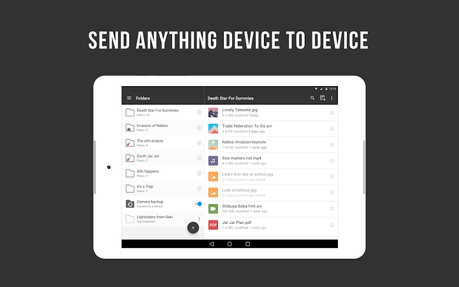
The current system will try to distribute the shares as widely as possible, using a different pseudo-random permutation for each file, but it is completely unaware of server properties like "location".
Resilio sync crashing how to#
We have a wiki page and some tickets (linked from the wiki page) about this but it's deeper than it looks and we haven't come to a conclusion on how to build it. " Q12: If I had 3 locations each with 5 storage nodes, could I configure the grid to ensure a file is written to each location so that I could handle all servers at a particular location going down? " I read the FAQ and this is apperently an asked question! I'm not surprised because I think many people are thinking of doing the type of thing I want to do. I was just glad to see that Syncthing also handles heavy use cases gracefully. It should be noted that Dropbox usually handles these massive file changes well, so moving to Syncthing has for me been more about it being open source and the possibility to keep files on my own machines.
Resilio sync crashing software#
He was only working on one machine.Īnd yes, I know it's "bad" to run scripts like this or switch git branches on top of sync software, but it happens, and it is interesting to see how different software handles these cases. Running the scirpt in a folder outside Dropbox left him with the correct final version of the file. Running the script in the Dropbox folder left him with some old version of this file and a failed test. The script was running a test which repeatedly created and deleted the same file before checking its correctness. I have also seen how a script run by a colleague managed to confuse Dropbox. However, the same problem with deleted files happened again after I had verified that this value was high enough on all machines. I thought it might be because /proc/sys/fs/inotify/max_user_watches had a low value on one machine, so I wrote back that they might want to add back the old warning about this. I was offered help to recover the files, but since I had already done so, I just told them I didn't need any more support on the issue.

I was in contact with Dropbox support about the issue and explained in detail what I had done and what happened. I was able to recover the changes from a backup, so it was no big deal in the end (although it left me a bit scared I could have lost those files without noticing). The end result was that Dropbox threw away the changes I had made on A and left me with the original state of B. moving between git branches).ģ) Noticed files were old or missing on B.Ĥ) Syncing files in some other folders worked, but nothing happened in the folder with missing files.ĥ) Restarted Dropbox on both machines in hope that this would trigger a fresh sync.Ħ) Observed files being reverted to old versions or deleted on machine A. The order of events were something along the lines of:ġ) Did work on computer A that caused massive file changes (i.e. Dropbox stopped picking up changes in the folder and eventually removed new changes once restarted. switching git branches) some files were never updated or synced. The issues I had didn't result in conflicted files. I was a bit brief in my comment above, so let me elaborate in case you or someone else is interested: I think that Dropbox typically handles conflicts quite well, and the issues I had are more likely bugs outside the conflict resolution implementation.
Resilio sync crashing free#
But we're not perfect-we do still find surprises from time to time, so feel free to contact support if you see something that looks wrong! So, yeah, I believe it is (in general) safe to assume that Dropbox is probably doing A-more-correct-thing for a complicated (and admittedly confusing) reason when it comes to sync behavior. The Dropbox client handles literally hundreds of special cases. Truly durable conflict management in the face of arbitrary mutations by user applications on the filesystem ends up being a really, really hard problem to cover exhaustively.

So we're able to tease out the "long tail" of weird file system and application behavior in a way that's very difficult for smaller projects. We've likely put 25-100x more resources into solving this problem over the last 10 years, and we just have a lot more data b/c we have 100s of millions of users on lots of platforms using Dropbox with every application you can imagine. It's definitely not impossible to do better than Dropbox, but to some degree, as in all things, it's a function of engineering resources, telemetry, and usage. Sorry, not super familiar with Syncthing.


 0 kommentar(er)
0 kommentar(er)
